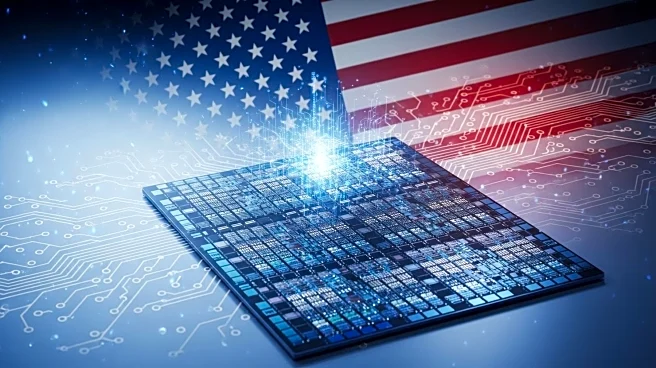What's Happening?
The Trump administration is reportedly planning to implement a policy requiring semiconductor companies to manufacture an equal number of chips domestically as they import from overseas. According to the Wall Street Journal, this initiative aims to bolster U.S. semiconductor production and reduce reliance on foreign manufacturers. Companies failing to meet the proposed 1:1 manufacturing ratio may face tariffs, as per sources familiar with the plan. This move is part of a broader strategy to enhance domestic manufacturing capabilities in the semiconductor industry, which is critical for various technological applications, including advanced computing and artificial intelligence.
Why It's Important?
The proposed mandate is significant as it addresses national security concerns and aims to strengthen the U.S. position in the global semiconductor market. By encouraging domestic production, the policy could reduce dependency on foreign suppliers, particularly from Asia, which currently dominates the semiconductor industry. This shift could lead to increased investment in U.S. manufacturing facilities, potentially creating jobs and fostering innovation within the sector. However, the imposition of tariffs on companies that do not comply may lead to increased costs for consumers and businesses relying on semiconductor products.
What's Next?
If implemented, the policy could prompt semiconductor companies to reassess their production strategies and invest in expanding U.S. manufacturing capabilities. Industry stakeholders, including major players like Intel and TSMC, may need to navigate the potential financial implications of tariffs and adjust their supply chains accordingly. The policy could also spark discussions among lawmakers and industry leaders about the balance between protectionism and global trade dynamics in the tech sector.
Beyond the Headlines
The mandate could have long-term implications for U.S. technological competitiveness and innovation. By fostering a robust domestic semiconductor industry, the U.S. may enhance its ability to lead in emerging technologies such as artificial intelligence and quantum computing. Additionally, the policy may influence international trade relations, as other countries could respond with similar measures to protect their own industries.










